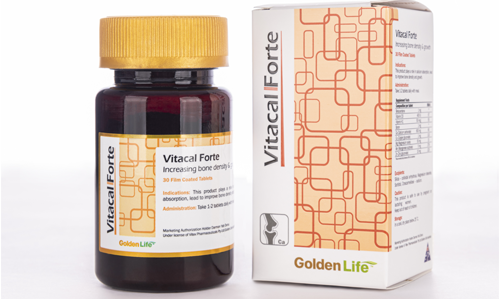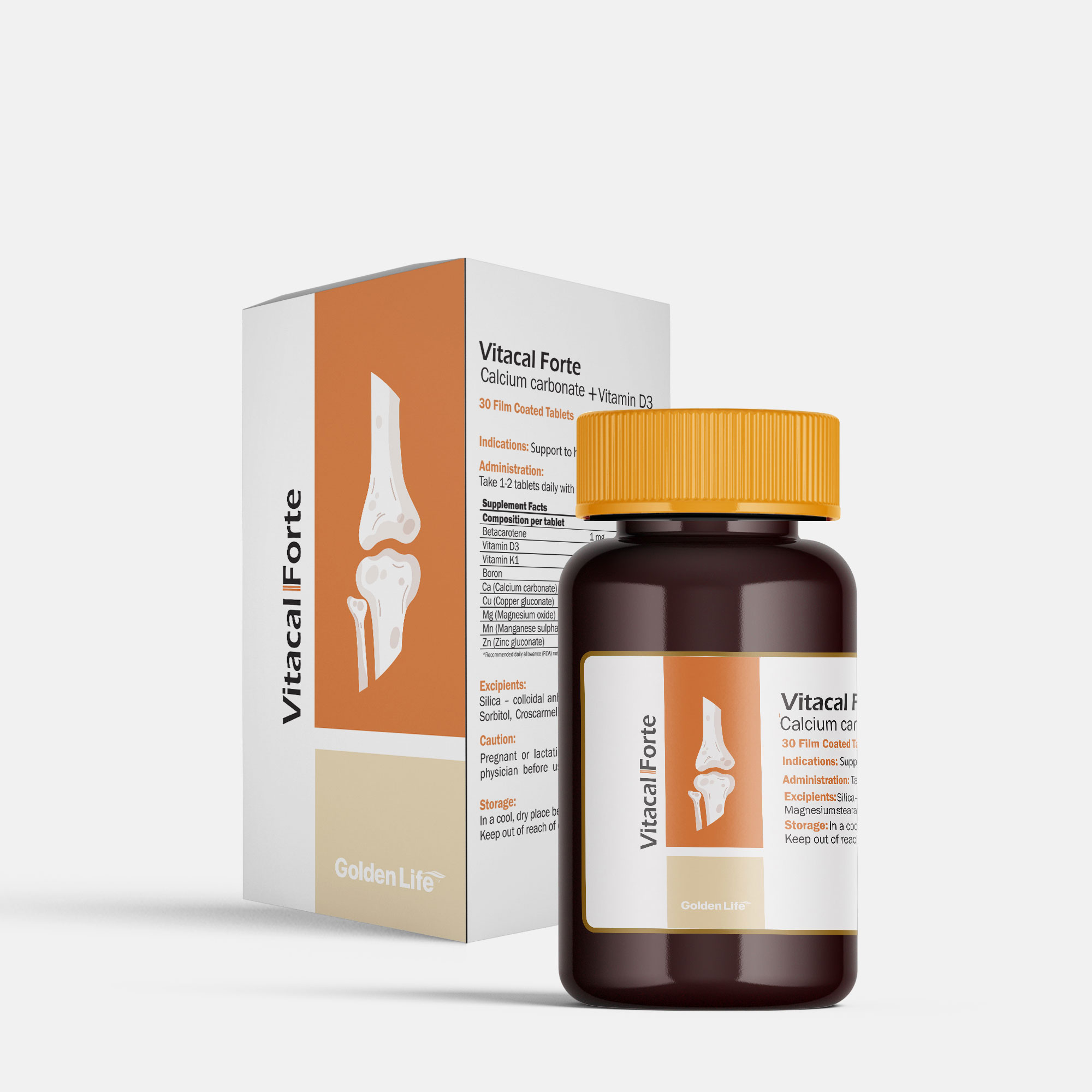Golden Life
Vitacal Forte


Beta-carotene
High beta-carotene intake was associated with low osteoporosis in males and females. High beta-carotene intake was associated with higher bone mineral density (BMD) and low osteoporosis
Vitamin D3
Vitamin D helps your body absorb and use calcium, which gives your bones their strength and hardness. There are three ways you can get vitamin D: Low vitamin D levels could increase your risk of osteoporosis and broken bones. And a severe shortage of vitamin D causes rickets and osteomalacia, which is soft, weak bones.
First, vitamin D is essential for bone health because it enhances your body’s ability to absorb calcium.
Vitamin K1
Vitamin K is thought to be important for bone health because it activates several proteins involved in bone formation. Poor dietary intake of vitamin K is associated with bone loss and fractures.
Boron
Boron appears to significantly improve the absorption of magnesium and its deposition at the bone level, Boron can aid in keeping your bones strong along with possibly improving brain function.
Boron is known to play a role in extending the half-life of vitamin D and estrogen.
The half-life is the amount of time it takes for a substance to break down to half its starting amount. Scientists aren’t exactly sure how boron does this. But it could be important for bone health in several ways.
Ca (Calcium Carbonate)
Calcium is a mineral responsible for making bones strong. Boron could help enhance bone health by increasing how long vitamin D works in your body.
Cu (copper gluconate)
It helps maintain healthy bones, blood vessels, nerves, and immune function, and it contributes to iron absorption. Sufficient copper in the diet may help prevent cardiovascular disease and osteoporosis, too.
Mg (Magnesium oxide)
Getting enough magnesium can bolster bone mass and strength by stimulating the release of the hormone calcitonin, which stabilizes calcium levels by drawing the mineral out of the blood and soft tissues and returning it to the bones.
Mn (Manganese sulphate)
It is found mostly in bones, the liver, kidneys, and pancreas. Manganese helps the body form connective tissue, bones, blood clotting factors, and sex hormones. It also plays a role in fat and carbohydrate metabolism, calcium absorption, and blood sugar regulation. manganese supplementation can increase both bone mineral density and bone formation
Zn (Zinc gluconate)
Zinc is not only a component of bone tissue but is also involved in the synthesis of the collagen matrix, mineralization, and bone turnover. It has been demonstrated that zinc can stimulate runt-related transcription factor 2 (Runx2) and promote the differentiation of osteoblasts.
RDA = Recommended daily allowance
IU = international unit
UL = Upper limit
| UL | RDA (%) | Amount Per Serving | Ingredients |
| * | * | 1 mg | Beta-carotene |
| 4000 IU/day | 67 | 400 IU | Vitamin D3 |
| * | 55 | 50 mcg | Vitamin K1 |
| * | * | 1 mg | Boron |
| 2500 mg/day | 60 | 600 mg | Ca (Calcium Carbonate) |
| 10000 mcg/day | 110 | 1 mg | Cu (copper gluconate) |
| 350 mg/day | 15 | 50 mg | Mg (Magnesium oxide) |
| 11 mg | 278 | 5 mg | Mn (Manganese sulphate) |
| 40 mg/day | 125 | 10 mg | Zn (Zinc gluconate) |
- Promotes bone growth and mineralization
- Increases bone density
- Helps prevent osteoporosis and bone loss.
Oral, take 1-2 tablets daily with meal or consult with physician.
Contraindications:
No contraindications have been reported to date.
Pregnancy and Lactation
This product is safe to use by pregnant or lactating women.
Pregnant or lactating women should consult a physician before using this product.
Interaction
No interaction with other medicinal products has been reported to date.
No adverse effect has been reported to date.